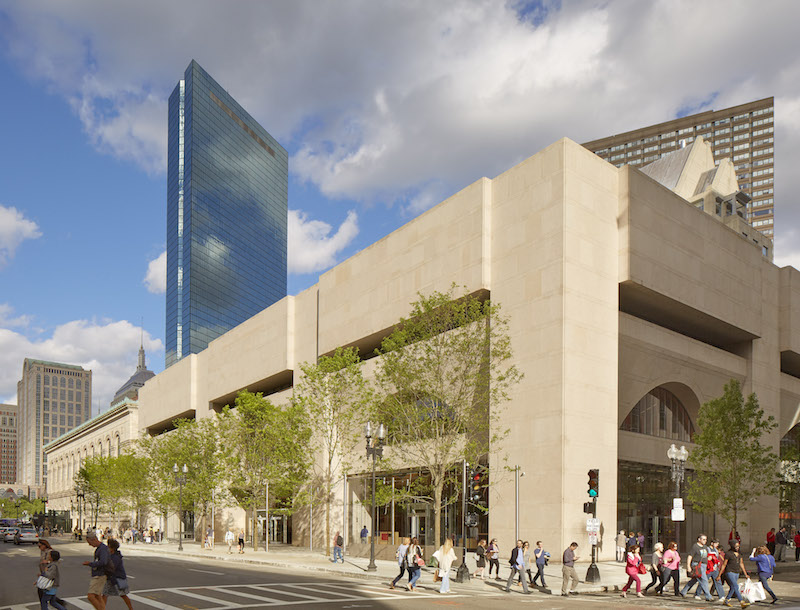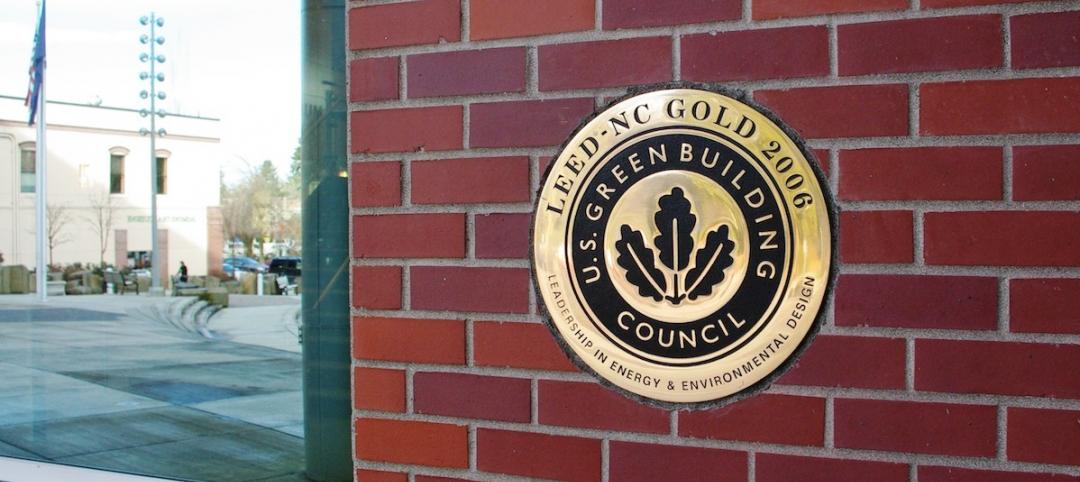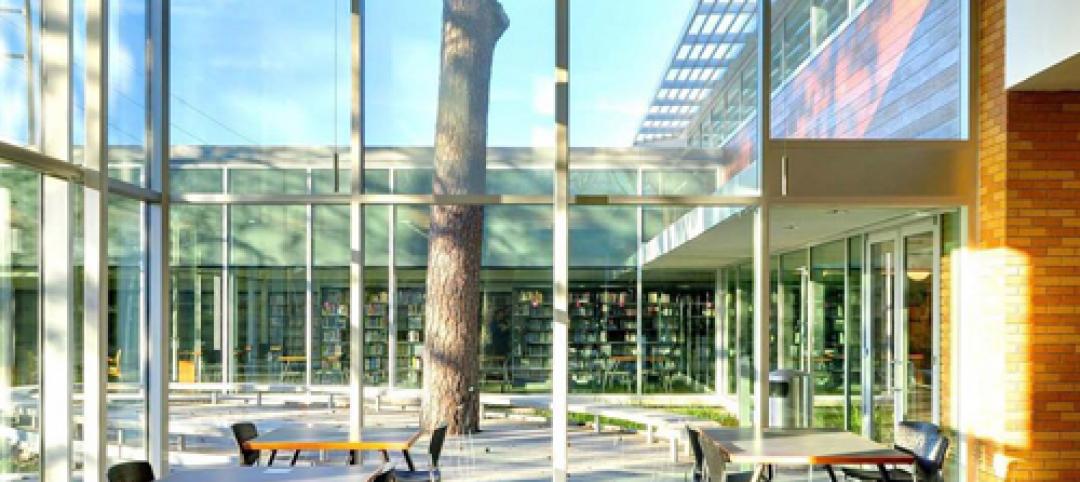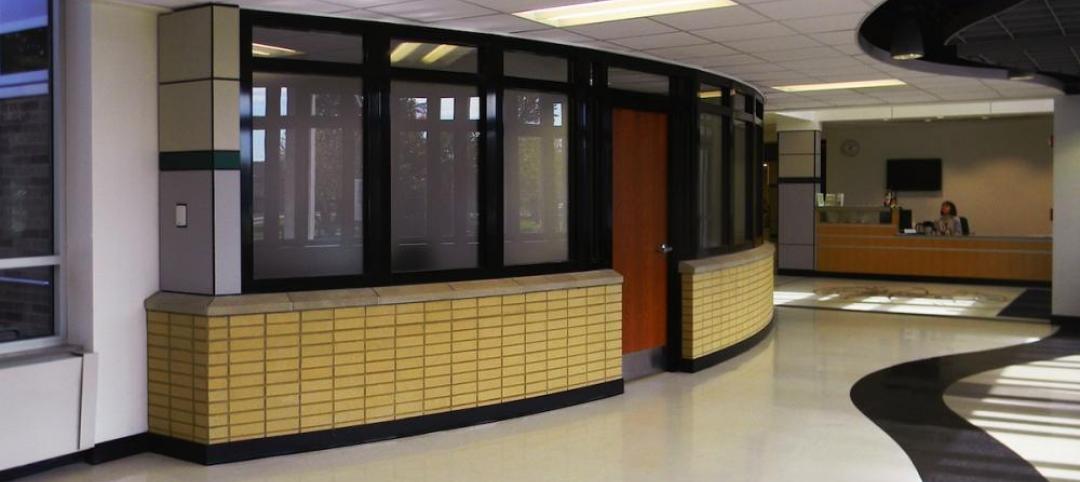About 1.5 million people visited the Boston Public Library between July 2016 and March 2017. That’s a 22% increase over what the library drew from July 2015 through March 2016.
That bump was attributable, in large measure, to the library’s $78 million renovation, the results of which debuted in July 2016. This three-year-long project, lead by William Rawn Associates | Architects and Consigli Construction, opened up and brightened what, by consensus, had been an uninviting space for patrons, disconnected from its Copley Square neighborhood.
The renovation—whose numerous accolades include, most recently, the 2017 Preservation Massachusetts, Paul and Niki Tsongas Award—achieved that goal in several ways.
Most notably, it created a 35-ft-wide, 210-ft-long connection between Johnson Building—a building designed by architect Phillip Johnson and opened in 1972—and the McKim Building, designed by Charles McKim and opened in 1892. Johnson was on record saying that he was never satisfied with the way the entrance and lobby to his building turned out. Neither were visitors who often found themselves wandering through labyrinthine corridors to get from one part of the library to the other.
“People were always getting lost,” said Cliff Gayley, a Partner with William Rawn Associates, who with Sindu Meier, a Senior Associate of the firm; and Phil Brault, Senior Project Manager with Consigli, recently spoke with BD+C about their work on transforming the library.
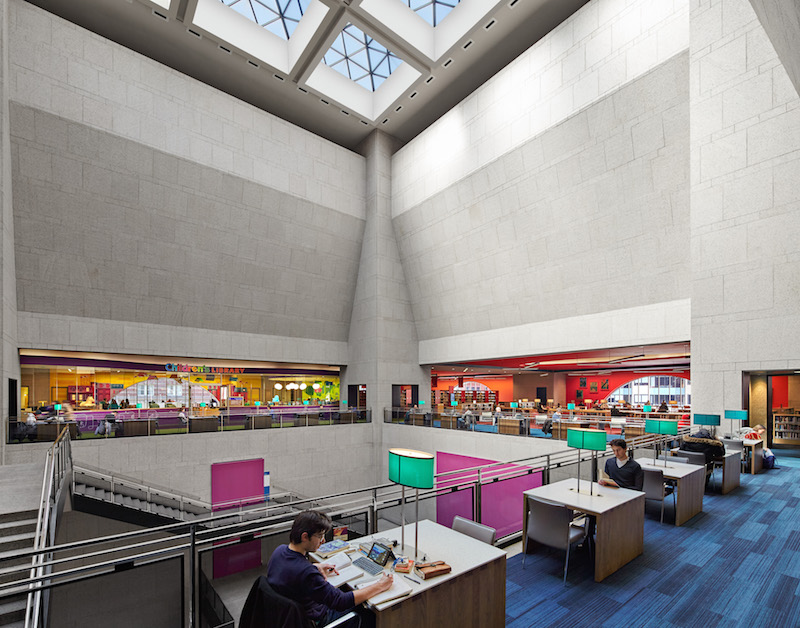 The second-floor renovation of Boston's Central Library doubled the size of the Children's library, and created quiet reading spaces around its periphery. The library's atrium, Deferrari Hall, provides ample natural sunlight. Image: Robert Benson Photography.
The second-floor renovation of Boston's Central Library doubled the size of the Children's library, and created quiet reading spaces around its periphery. The library's atrium, Deferrari Hall, provides ample natural sunlight. Image: Robert Benson Photography.
The master plan for this landmark library’s overhaul was drawn up in 2012, soon after which “it became clear very quickly that the building had been designed for a different time,” recalled Meier.
To create a more logistically elegant pathway between the two buildings, the Building Team needed to support the McKim Building’s load-bearing but fragile masonry wall with structural framing and shoring that could withstand a load of over 1 million pounds.
The team devised a steel framing system, preloaded with hydraulic jacks, which allowed for the removal of two concrete columns below the second floor that each handled a load of over 300,000 pounds.
The renovation also removed ugly tinted windows that offered virtually no outside view, as well as 97 granite plinths that formed a barrier around the Johnson building. In their place is a more amenable façade of two-story-high windows that, at ground level, is flush with the sidewalk, making the building appear more approachable from the street.
A movable tunnel system from Boylston Street allowed the library to stay open during construction. The Building Team hauled in building materials through second-floor windows during the renovation, which was conducted in two phases
The first, which was completed in February 2015, spruced up the second floor by doubling the size of the Children’s library, introducing a maker space for teenagers, and creating reading and classroom areas around the perimeter.
Phase two, completed in the summer of 2016, revitalized the lower floor’s Kirsten Business Library and Innovation Center. The entrance to the newly created two-story Boylston Hall offers a Welcome Center and circulation desk (moved back about 75 feet from the door, said Gayley), with informational touch screens that, among other things, allow visitors to peruse the library’s digital catalog.
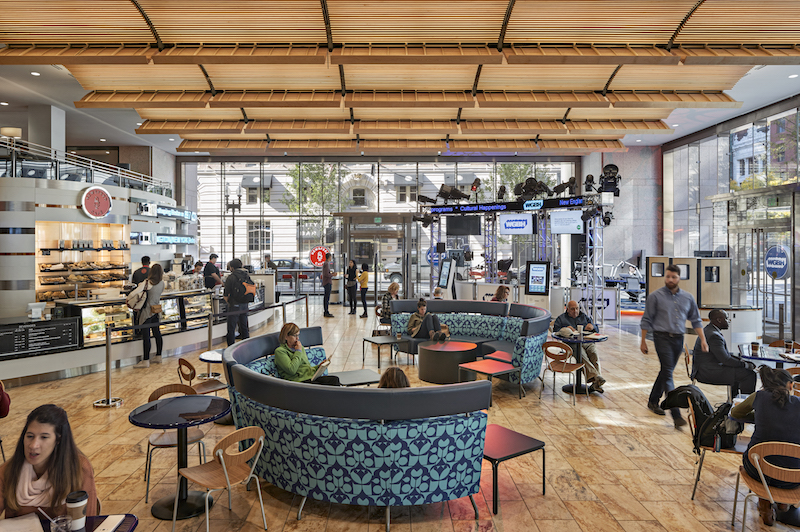
The newly created Boylston Hall leads visitors to a glass-enclosed area with a cafe and a satellite studio for WGBH. It was important to library officials that the renovation include a retail component. Image: Robert Benson Photography
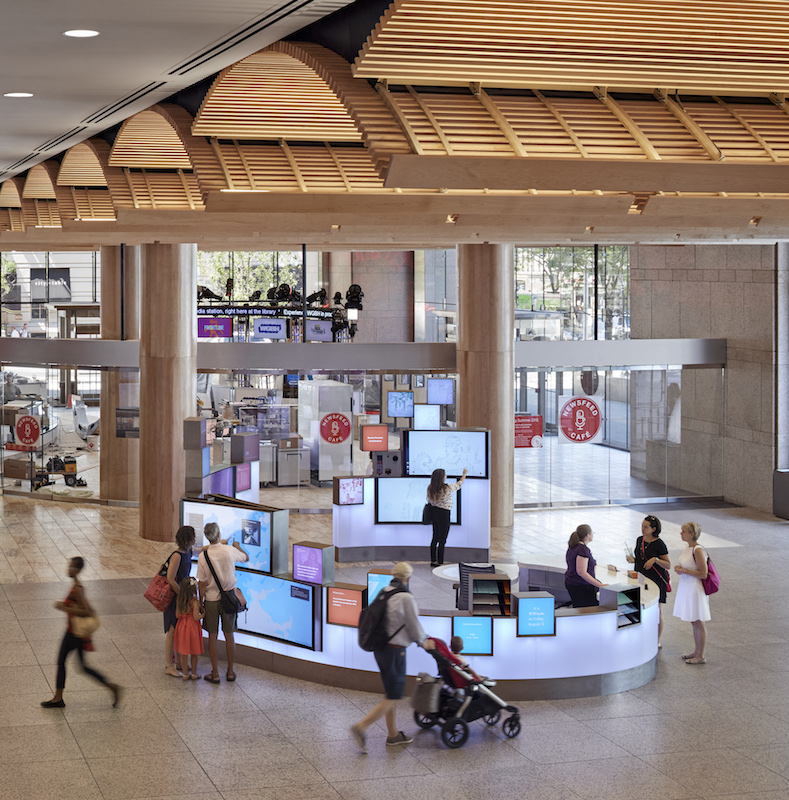 A Welcome Center at the library's entrance offers a digital experience to visitors. Image: Robert Benson Photography
A Welcome Center at the library's entrance offers a digital experience to visitors. Image: Robert Benson Photography
That Boylston Street entrance, encompassed by glass, leads visitors to the library’s Newsfeed Café, managed by Catered Affair; as well as a “new and novel” section for fiction and nonfiction, and a satellite television studio for WGBH, Boston’s public station. “Libraries are struggling to remain relevant, and this project exhibits forward thinking and entrepreneurship,” observed Brault. A fetching curved wood-slatted ceiling accents this area.
A total of 156,000 sf were added or improved by this renovation, which included making activities on each floor visible and transparent via Deferrari Hall, the Central Library’s striking atrium, which bathes its more-open and colorful spaces in natural light from the library’s roof.
Related Stories
| Jul 2, 2013
LEED v4 gets green light, will launch this fall
The U.S. Green Building Council membership has voted to adopt LEED v4, the next update to the world’s premier green building rating system.
| Jul 1, 2013
Report: Global construction market to reach $15 trillion by 2025
A new report released today forecasts the volume of construction output will grow by more than 70% to $15 trillion worldwide by 2025.
| Jun 28, 2013
Building owners cite BIM/VDC as 'most exciting trend' in facilities management, says Mortenson report
A recent survey of more than 60 building owners and facility management professionals by Mortenson Construction shows that BIM/VDC is top of mind among owner professionals.
| Jun 17, 2013
DOE launches database on energy performance of 60,000 buildings
The Energy Department today launched a new Buildings Performance Database, the largest free, publicly available database of residential and commercial building energy performance information.
| Jun 7, 2013
First look: Austin breaks ground on 'light-filled' Central Library
The design scheme by Lake|Flato and Shepley Bulfinch incorporates reading "porches" and a light-filled, six-story atrium.
| Jun 5, 2013
USGBC: Free LEED certification for projects in new markets
In an effort to accelerate sustainable development around the world, the U.S. Green Building Council is offering free LEED certification to the first projects to certify in the 112 countries where LEED has yet to take root.
| Jun 3, 2013
Construction spending inches upward in April
The U.S. Census Bureau of the Department of Commerce announced today that construction spending during April 2013 was estimated at a seasonally adjusted annual rate of $860.8 billion, 0.4 percent above the revised March estimate of $857.7 billion.
| May 29, 2013
6 award-winning library projects
The Anacostia Neighborhood Library in Washington, D.C., and the renovation of Cass Gilbert’s grand Beaux-Arts library in St. Louis are among six projects to be named 2013 AIA/ALA Library Building Award winners.
| May 21, 2013
7 tile trends for 2013: Touch-sensitive glazes, metallic tones among top styles
Tile of Spain consultant and ceramic tile expert Ryan Fasan presented his "What's Trending in Tile" roundup at the Coverings 2013 show in Atlanta earlier this month. Here's an overview of Fasan's emerging tile trends for 2013.
| Apr 30, 2013
Tips for designing with fire rated glass - AIA/CES course
Kate Steel of Steel Consulting Services offers tips and advice for choosing the correct code-compliant glazing product for every fire-rated application. This BD+C University class is worth 1.0 AIA LU/HSW.


